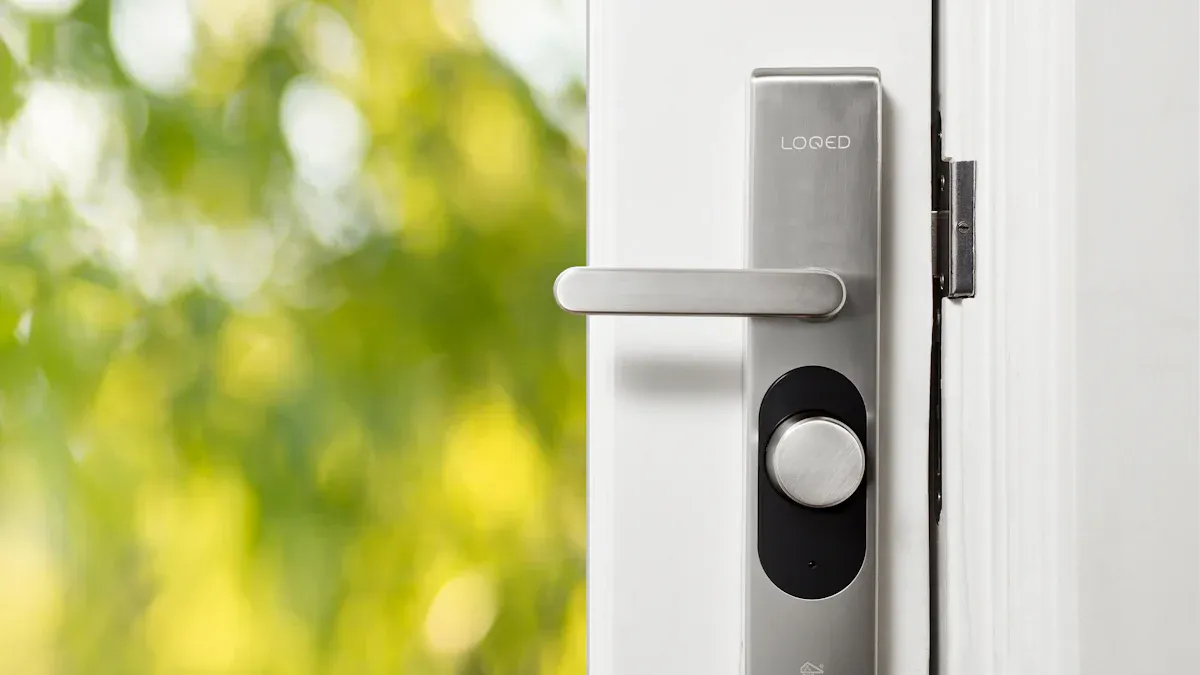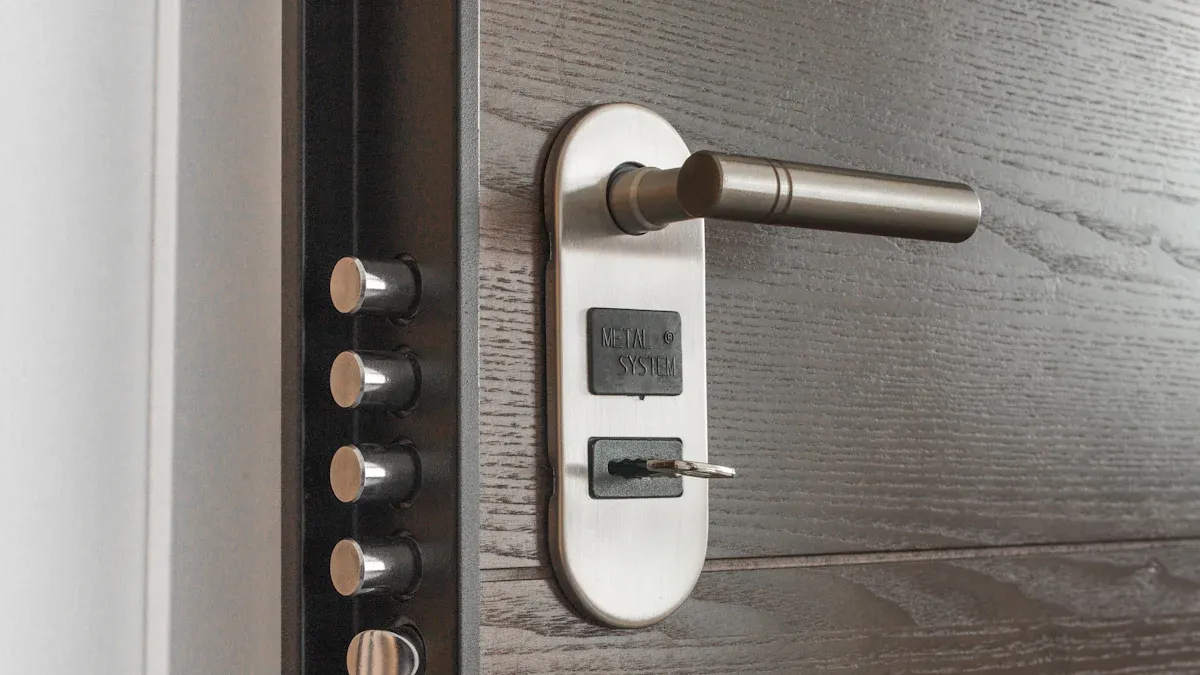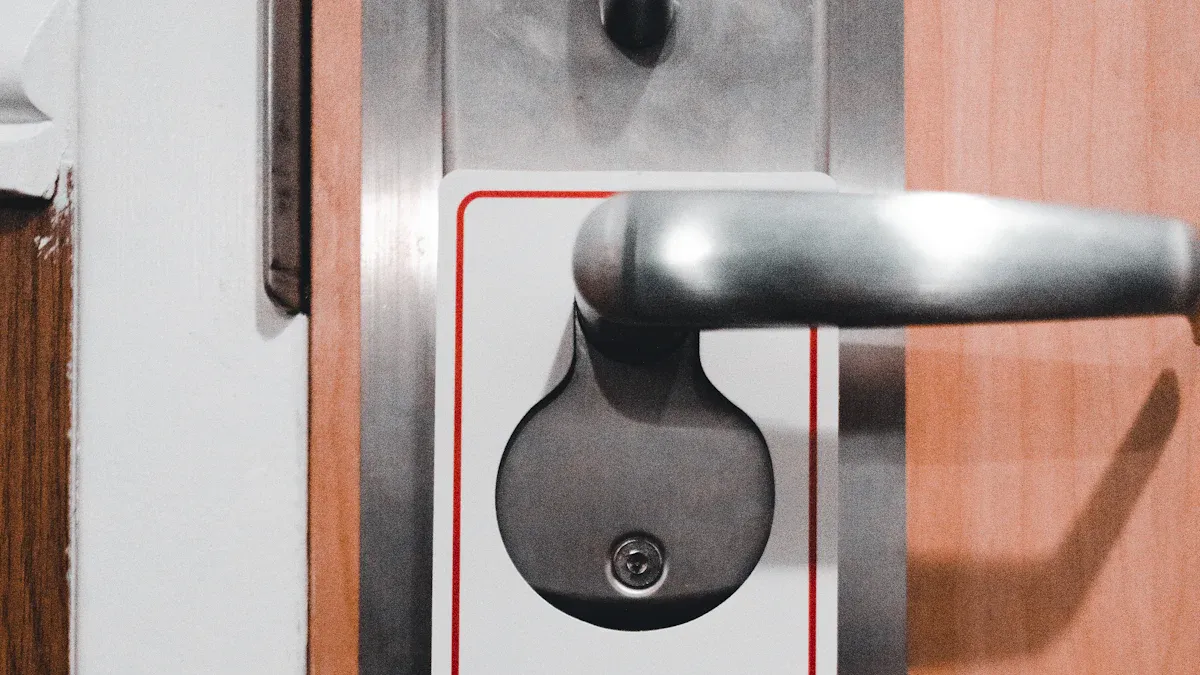
The hospitality industry continually seeks innovative ways to enhance guest security and convenience. Smart hotel locks have emerged as a pivotal advancement, combining technology with functionality. By integrating traditional handles with modern tech integration, hotels can offer reliable and familiar solutions. This balance ensures that hospitality solutions remain both user-friendly and future-ready.
Key Takeaways
- Mixing old-style handles with smart locks makes hotels safer and comfy.
- Using RFID and fingerprint systems makes entry easy and secure.
- Spending on mixed systems saves money, time, and attracts more guests.
The Role of Traditional Handles in Hospitality Solutions
Guest trust and familiarity with traditional mechanisms
Traditional door handles have long been a staple in the hospitality industry. Guests often associate these mechanisms with reliability and ease of use. Unlike fully digital systems, traditional handles provide a tactile experience that feels intuitive. This familiarity reduces the learning curve for guests, especially those who may not be comfortable with advanced technology.
Guests value systems that are straightforward and dependable. Traditional handles offer a sense of security by maintaining a physical barrier that is easy to operate yet robust in design.
Hotels catering to diverse demographics benefit from retaining traditional handles. These mechanisms ensure accessibility for all age groups, including older guests who may prefer conventional solutions. By integrating traditional handles with modern technology, hotels can strike a balance between innovation and guest comfort.
Durability and cost-effectiveness of traditional handles
Traditional handles, particularly those made from metal, are designed to withstand high-use environments like hotels. Their durability and resistance to wear make them a practical choice for hospitality solutions.
- Metal door handles dominate the market, holding a projected 53.16% share in 2024.
- Their corrosion resistance ensures longevity, even in humid or high-traffic areas.
- Fire- and impact-resistant properties enhance their reliability for security applications.
These features contribute to their cost-effectiveness. Hotels can reduce maintenance expenses by investing in handles that require minimal repairs or replacements. Additionally, the design flexibility of metal handles allows them to complement various interior styles, adding aesthetic value without compromising functionality.
Key Features of EU Smart Lock Technology

Contactless access and RFID integration
Contactless access has revolutionized hotel security by offering convenience and reducing risks associated with traditional keys. RFID technology plays a pivotal role in this transformation. Each RFID card contains a unique ID code, making duplication nearly impossible. This feature significantly reduces unauthorized access risks. Additionally, smartphone-based keys further enhance security by eliminating the chances of loss or sharing.
Real-time tracking of RFID card usage allows hotel management to monitor access patterns and respond swiftly to potential threats. This capability ensures a safer environment for guests and staff alike.
Hotels benefit from the seamless integration of RFID systems with property management software. This integration streamlines check-in processes and enhances the overall guest experience.
Biometric and voice recognition advancements
Biometric technology has emerged as a reliable solution for hotel access control. By utilizing unique physiological traits, such as fingerprints or facial features, biometric systems ensure precise authentication. These systems are harder to forge or steal compared to traditional methods, providing a higher level of security.
| Feature Description | Benefit |
|---|---|
| Biometric authentication ensures only authorized access. | Reduces unauthorized entry and enhances guest safety. |
| Voice recognition offers hands-free access. | Improves convenience for guests carrying luggage or with limited mobility. |
| Eliminates the need for physical keys or cards. | Reduces the risk of credential loss and simplifies the guest experience. |
These advancements not only enhance security but also align with the hospitality industry’s goal of offering seamless and personalized experiences.
IoT compatibility and sustainability initiatives
The integration of IoT technology has elevated smart lock systems to new heights. Advanced wireless technologies, such as NFC and low-power Bluetooth, enable compatibility with other smart devices. This connectivity allows hotels to create a unified ecosystem, improving operational efficiency.
The European smart lock market, valued at USD 0.61 billion in 2024, is projected to reach USD 1.71 billion by 2033. This growth reflects the increasing demand for sustainable and energy-efficient solutions. For instance, the Smart Lock Pro (4th Generation) by Nuki utilizes innovative energy-saving technologies, demonstrating the industry’s commitment to sustainability.
IoT-enabled smart locks not only enhance guest convenience but also reduce energy consumption, aligning with global sustainability goals.
Benefits of Combining Traditional Handles with Smart Technology

Enhanced security through hybrid systems
Hybrid systems that combine traditional handles with smart lock technology offer a robust approach to hotel security. Traditional handles provide a physical barrier that guests trust, while smart locks add advanced features like real-time monitoring and access control. This combination ensures that hotels can address both physical and digital security concerns effectively.
Hotels benefit from centralized control systems that allow management to monitor and manage access across the property. For instance, smart locks integrated with traditional handles can alert staff to unauthorized access attempts, enabling swift action. This layered security approach not only protects guests but also safeguards hotel assets.
Hybrid systems enhance security by combining the reliability of traditional mechanisms with the sophistication of modern technology. This dual-layered approach ensures peace of mind for both guests and hotel operators.
Seamless guest access and personalized experiences
Integrated systems create a seamless experience for guests, making their stay more enjoyable and stress-free. By combining traditional handles with smart technology, hotels can offer intuitive access solutions that cater to diverse guest preferences. For example, guests can use RFID cards or smartphone apps to unlock their rooms, while still having the option of a traditional handle for manual operation.
- Integrated systems create seamless experiences that make guests feel understood and appreciated, enhancing their overall satisfaction and loyalty.
- Personalization through service design enables hotels to cater to individual preferences, making guests feel recognized and valued.
- Data-driven insights from integrated systems encourage repeat visits and increased spending by personalizing guest experiences.
Hotels that prioritize personalization can use data from smart systems to tailor in-room settings, such as lighting and temperature, to individual preferences. This level of customization not only enhances the guest experience but also fosters loyalty and repeat visits.
Operational efficiency for hotel management
Hybrid access systems streamline operations, reducing the workload for hotel staff and improving overall efficiency. By integrating traditional handles with smart locks, hotels can automate processes like check-ins and check-outs, freeing up staff to focus on other tasks. This automation leads to faster service and a more efficient allocation of resources.
- Enhanced Guest Experience: Streamlines access to rooms and amenities, improving overall guest satisfaction.
- Improved Security: Centralized management of security across the property enhances safety for guests and staff.
- Operational Efficiency: Reduces staff workload by streamlining check-ins and check-outs, leading to cost savings.
Centralized management systems also improve security by allowing hotel operators to monitor access in real time. This capability ensures that any issues, such as lost keys or unauthorized access, can be addressed promptly. Additionally, the cost savings from reduced staff workload and maintenance make hybrid systems a financially viable solution for modern hospitality solutions.
Addressing Challenges in Integration
Privacy concerns and secure data protocols
The integration of smart lock technology in hotels introduces significant privacy concerns. As digital systems collect and store sensitive guest information, such as access logs and personal data, the risk of cyberattacks increases. Recent ransomware incidents have highlighted vulnerabilities in hotel security systems, where attackers compromised guest data, leading to financial and reputational damage. Hotels must adopt robust cybersecurity measures to mitigate these risks.
Implementing secure data protocols, such as end-to-end encryption and multi-factor authentication, can safeguard guest information. These measures ensure that only authorized personnel can access sensitive data, reducing the likelihood of breaches.
Staff training also plays a critical role in maintaining data security. Employees must understand the importance of adhering to privacy policies and recognizing potential threats. Smaller hotels, however, often face challenges in allocating resources for comprehensive training programs. Addressing these gaps is essential for ensuring the safe integration of smart technologies into hospitality solutions.
Compatibility between traditional and smart systems
Combining traditional handles with smart lock technology presents compatibility challenges. Many hotels operate with legacy systems that may not integrate seamlessly with modern smart locks. Variations in technology standards and communication protocols further complicate the adoption process. For example, some locking mechanisms may fail to work effectively together, leading to operational disruptions.
Technical issues, such as battery failures or network outages, can also hinder the functionality of smart locks. These problems may leave guests locked out of their rooms or compromise overall security. To address these challenges, hotels should invest in systems designed for interoperability. Selecting smart locks that align with existing infrastructure minimizes disruptions and ensures a smoother transition.
Hotels must also consider the long-term reliability of their chosen systems. Regular maintenance and updates can prevent technical failures and extend the lifespan of integrated solutions.
Cost management and ROI considerations
The financial implications of integrating traditional handles with smart lock technology can be significant. Hotels must carefully manage costs while ensuring a strong return on investment (ROI). Identifying inefficiencies in current systems is a critical first step. For instance, benchmarking performance against industry standards can reveal areas where improvements are needed.
| Key Performance Indicators (KPIs) | Insights for Cost Management and ROI |
|---|---|
| Identifying Inefficiencies | KPIs reveal areas of excessive costs. |
| Benchmarking Performance | Comparing KPIs against industry standards helps identify improvement areas. |
| Strategic Decision-Making | Informed decisions can streamline operations and reduce costs. |
Financial statements provide valuable insights into operational efficiency. By analyzing these metrics, hotels can identify cost-saving opportunities and make informed decisions about technology investments. For example, integrating smart locks with property management systems can reduce staff workload, leading to lower labor costs. Additionally, centralized control systems enhance security and operational efficiency, further contributing to ROI.
Hotels must also consider the scalability of their chosen solutions. Investing in systems that can adapt to future technological advancements ensures long-term value. This approach not only optimizes costs but also positions hotels as leaders in innovative hospitality solutions.
Future Trends in Hospitality Solutions
AI-powered access control systems
Artificial intelligence (AI) is transforming access control in modern hotels. Facial recognition technology, for instance, allows guests to bypass traditional check-in processes. This innovation reduces wait times from over three minutes to less than one minute. Marriott International has already begun testing facial recognition check-in machines in select locations. Guests simply scan their IDs, take a photo, and receive their room keys. This streamlined process enhances security while improving the overall guest experience.
AI-powered systems also enable predictive analytics. By analyzing guest behavior, hotels can anticipate needs and personalize services. For example, AI can adjust room settings based on past preferences, creating a more tailored experience. These advancements position hotels as leaders in innovative hospitality solutions.
5G and IoT shaping hotel security innovations
The rollout of 5G networks is revolutionizing the Internet of Things (IoT) in the hospitality sector. Faster connectivity enables real-time communication between smart devices, enhancing operational efficiency. IoT-enabled smart locks, for example, integrate seamlessly with hotel management systems. This integration allows for real-time monitoring and keyless entry, improving both security and convenience.
European hotels like Radisson Blu in Berlin and Hôtel Lutetia in Paris have adopted these technologies. Both report improved guest satisfaction and operational efficiency. As 5G becomes more widespread, hotels can expect even greater advancements in IoT applications.
The evolution of guest-centric smart lock features
Smart locks are evolving to prioritize guest-centric features. Keyless entry, for instance, eliminates the need for physical keys, reducing the risk of loss. These locks also integrate with mobile apps, allowing guests to control room access remotely. Some systems even offer voice-activated entry, providing hands-free convenience.
Hotels adopting these features are better positioned to attract tech-savvy travelers. Post-pandemic, guests increasingly value contactless solutions. By embracing these innovations, hotels can enhance guest satisfaction and operational efficiency.
Integrating traditional handles with EU smart lock technology offers numerous advantages for modern hotels. This combination enhances security, streamlines guest access, and improves operational efficiency. For example, the Ice Hotel in Sweden reported positive feedback on ease of access and security after adopting smart handle locks. Similarly, a boutique hotel in Oslo improved guest satisfaction by integrating smart locks with room automation. These innovations position hotels as leaders in hospitality solutions, ensuring a competitive edge in the market. Embracing such advancements allows hotels to deliver exceptional guest experiences while optimizing operations.
FAQ
What are the key benefits of integrating traditional handles with smart locks?
Combining traditional handles with smart locks enhances security, simplifies guest access, and improves operational efficiency. This hybrid system balances reliability with modern convenience.
How can hotels address privacy concerns with smart lock systems?
Hotels can implement end-to-end encryption, multi-factor authentication, and staff training to protect guest data and reduce risks of cyberattacks.
Are smart locks compatible with older hotel infrastructure?
Many smart locks offer interoperability with legacy systems. Hotels should select solutions designed for seamless integration to avoid operational disruptions.
Post time: Apr-14-2025
